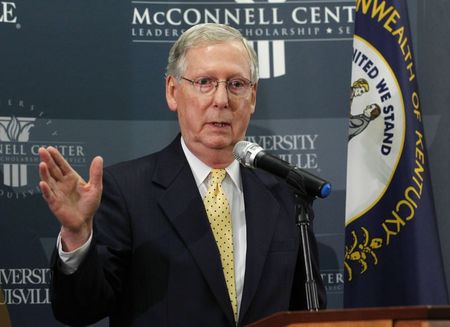By Valerie Volcovici and David Lawder
WASHINGTON (Reuters) - Republican congressional leaders on Wednesday wasted no time in criticizing what they called President Barack Obama's "one-sided" climate deal with China, using the announcement to declare war on the administration's plan to use executive actions to combat carbon emissions.
In brokering a high-profile pact with China, the Obama administration knew it would preempt one of the most often-cited arguments Republicans have used to argue against mandatory domestic carbon cuts: China will continue to pollute unabated.
But even with China vowing to curb its carbon, Republicans were quick to question the validity of China's headline-grabbing pledge and used the announcement to rally the party as it prepares to lead Congress by promising to do what it can to rein in the Environmental Protection Agency, whose rules will achieve the bulk of promised emissions cuts.
"As we enter a new Congress, I will do everything in my power to rein in and shed light on the EPA's unchecked regulations," said Oklahoma Senator James Inhofe, a climate change skeptic and critic of U.N. climate talks who will become the chair of the Senate Environment and Public Works Committee in January.
China and the United States agreed on Wednesday to new limits on carbon emissions starting in 2025. For the first time, China vowed to cap its emissions by at least 2030.
Senator Mitch McConnell, a Kentucky Republican and incoming Senate majority leader, said his main goal when he takes the gavel is to get "the EPA reined in."
He questioned the stringency of China's pledge on Wednesday at a photo session with newly elected Republican senators on the first day of a "lame-duck" session of Congress. A new Republican majority takes control of the Senate from Democrats in January.
"As I read the agreement, it requires the Chinese to do nothing at all for 16 years, while these carbon emission regulations are creating havoc in my state and in other states across the country."
McConnell made criticism of the Obama administration's planned restrictions on coal-fired power plant emissions a central theme of his own re-election campaign in Kentucky, a major coal-mining state.
He declined to say what actions Republicans will take regarding the carbon emission deal, adding, "We'll be discussing all that with our colleagues here in the next few days before we get ready to take over the new majority."
Previously, McConnell said a viable tool Republicans have is the federal budget process, which they can use to squeeze the EPA's operations or tie measures to kill EPA rules to must-pass spending bills.
He also earlier in the year said he could look to a rarely used law - the Congressional Review Act - to repeal the EPA's regulations. However, he would need to wait until June to use it because that is when they will be finalized.
Lawmakers are also likely to use the federal budget to prevent the State Department from offering funding to the United Nations' Green Climate Fund to help the world's least developed countries adapt to the effects of climate change, which is expected to build the confidence of developing countries in U.N. talks.
Stuart Eizenstat, the head of the U.S. delegation under President Clinton who negotiated the Kyoto Protocol in the 1990s, said Republicans in Congress are never going to be moved by commitments by China. The Kyoto Protocol, which the United States did not sign, commits signatory countries to set binding emission reduction targets.
He said they will stick to a combination of climate change denialism and a repeated argument that the United States will be forced to make carbon emission cuts while China has more than a decade to even start.

"The counter to that is to recognize the historic nature of this. It would be a shame to dampen China's willingness to take action," he said in an interview.
(Reporting by David Lawder; Editing by Doina Chiacu and Steve Orlofsky)
